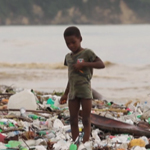Case Study - Reflections From Haiti: CASCAF
Ingenuity and community engagement forwards appropriate solutions for waste management

Inadequate solid waste management in developing countries contributes to the degradation of communities, the environment, and public health. The risks are particularly severe for nations with wet climates that mobilize wastes and large coastlines that allow release of nondegradable waste, such as plastic, into the contiguous watersheds and the marine environment. Haiti is one such nation. With over seven million people and the distinction of the poorest country in the Americas, Haiti has a history of failure to develop sustainable waste management infrastructure and community-level participation in addressing solid waste pollution. Natural events such as earthquakes, tropical storms and and hurricanes multiply the severity of the Haitian waste management challenge.
In 2006, the United Nations Development Programme (UNDP) initiated a solid waste management program in Carrefour Feuilles, Haiti. According to the UNDP, the "project improves the urban environment and increases stability through the collection, recycling and transformation of solid waste. The project has created two new streams of revenue: the production of cooking briquettes that replace wood charcoal, and the production of compost for agriculture." The cited impacts have been:
- Quality employment for more than 385 people, 57 percent of whom are women, each earning at least USD 3 per day for four hours’ work, contributing to the reduction of violence and vulnerability
- Cleaner streets—70 percent of streets are now cleaned daily—reducing the incidence of disease, improving circulation, and preventing the blockage of canals by waste, in turn reducing the incidence of flooding and reducing carbon emissions
- Recycling of 30 percent of overall waste into:
o Fuel (as cooking briquettes), reducing costs (by 78 percent) for poor families and reducing deforestation caused by the production of wood charcoal
o Compost sold for agriculture - Strengthened civil education and community organization, achieved through the creation of the CASCAF organization, which is responsible for selling the project’s products and ensuring its self-sustainability.
In July 2010, the International Federation of Red Cross and Red Crescent Societies produced the post-earthquake report Haiti - From sustaining lives to sustainable solutions: the challenge of sanitation which updates the status of sanitary and solid waste challenges for Haiti.
The grassroots Sanitary Action Committee of Carrefour-Feuilles (CASCAF in French) formed as a result of UNDP action is a success story that has survived the January 12, 2010 earthquake. In 2010, Challenge Your World produced the documentary short Reflections from Haiti: CASCAF exploring the solid waste management struggle of Haiti. It is one of a series of six documentaries intended to depict the challenges Haitians face as well as the community-led solutions they initiated on the field. The film offers a dynamic, visually appealing, and informative analysis of the Haitian solid waste challenge. As told by those directly impacted and empowering the positive change, Reflections is an inspirational story of a community partnership investing in a better world for today and tomorrow. -GM
About the Film: Twelve minutes. Presented by Challenge Your World, a former company that was formed to enable the interaction of university/college professors and students, non-governmental organizations, governmental agencies, and the corporate world through Collaboration Sourcing of Sustainability Improvement Opportunities for people and organizations. Reflections from Haiti: CASCAF was directed by Dominique Laurence and narrated by Stephanie Lapointe. Film used with permission.

